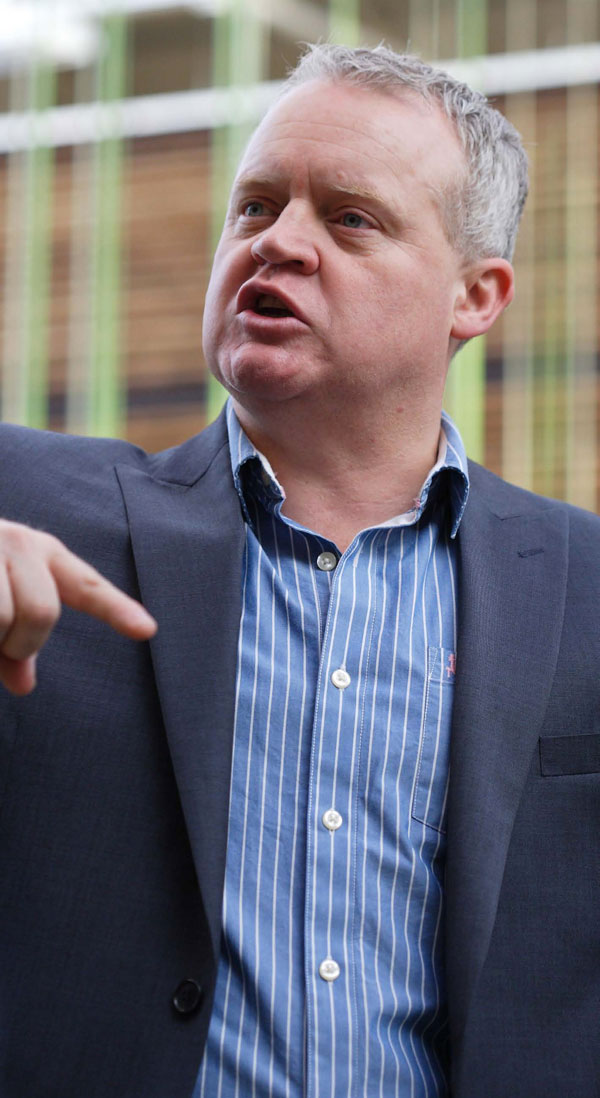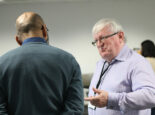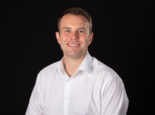Mike Greene – The Secret Millionaire
Do you see things changing for the better in Peterborough?
Like I said, I moved to Peterborough at the age of 11. And then from about 23 to about 35, didn’t live in Peterborough, because I was chasing careers down. But the reason I moved back once we had Rosie was because I love it. I think it’s a great location. It’s got great shopping, it’s got great connections, and I like the people. My family are mostly here too. I’m very proud of it. I’m very proud of the Cathedral and I am one of the sponsors and supporters of the Cathedral’s Peterborough 900 campaign. But when I did Secret Millionaire, there was some criticism that I’d made Peterborough look bad. To those people, I would say that you only have to look at statistics of our child poverty and education to see we don’t look very good when compared to national averages. So, there is a problem in Peterborough. The sooner people accept that, and then ask how we work to resolve it, the better. And that’s what I want to be involved in – how we make Peterborough a better place. Keeping on saying it’s all rosy in the garden doesn’t actually make it rosy – until you put the work and effort in to make it that way.
What about the future of retail on the high street?
There have been some major casualties of late… When I first worked in Spar’s 8 Till Late development team – around 20 years ago – grocery-type retailers were shutting on Sundays, shutting half day on Saturdays, and probably shutting a half day in the week as well, and they weren’t open past about 6pm. There was a need to teach them that people’s lifestyles were moving more 24 hour, and that they’d have to move in line with customers’ needs and wants to thrive. My boss at the time was a chap called John Irish – an outstanding retail guru – and one of the things he used to say is that retail is like dancing with elephants; you’re either quick, or you’re dead. And that’s true today.
There’s a lot I respect about Mary Portas, but it’s not enough to say we’re going to put markets in high streets to attract people there. One, how does that help big stores, and two, it’s quite disrespectful to say its just about the stores. It’s about planning too. Peterborough isn’t so bad, but most high streets that have been pedestrianised make it virtually impossible for people to pop in and get to the stores they want to get to quickly and easily. And that’s why a lot of high streets are dying, and it’s made it easy for the internet to just pick up business with the convenience of you being able to go online, order it and have it delivered. Retailers need to constantly adapt to what consumers need, and planners need to be aware of how they help or hinder that.
What advice would you give to someone setting up in business right now?
Get a strategy. Have a clear plan of what it is you want to do, what it is you want to achieve,
and what you need to do to get there. Saying “have a strategy” is maybe blindingly obvious, but for 90 per cent of businesses it’s all in their head, and they’re washed away with the excitement of it and put very little effort into planning, especially the first three years. Secondly, I would say look at your business plan or idea with the most critical eyes, as if you were your enemy trying to pull holes in it. Think of worst-case scenarios. Thirdly, don’t rush into it, because once you’re in a business you’re pretty much running to keep that business going. So many people, if they’d taken an extra month or two to make sure everything was really in place before they pressed the start button, would have a fighting chance. They often jump in too quickly, or leave their job to run the business too soon and add a financial burden. Once you’re in business, you’re probably a long time in it, so there’s no rush to do it today. In three months time it’ll still be there and you’ll be a lot better prepared.
What’s next for you?
The same principles that I’ve worked to for the last ten to fifteen years. The first thing is to do something that really challenges me every year. I think if you stop learning and growing you start dying. One of my mentors said that you need to punctuate every year with something that is very different from your “normal”, so you will see your “normal” from a different perspective. That was the start of me doing mountains and marathons and cycles and so on. So this August I’ll be sailing down to Rio on a 68-foot clipper in this year’s Clipper Round the World Yacht Race. I’d never been on a
boat before – I did two week’s training, I’ll do another week’s training and then I’ll be racing.I’ll still do a challenge every year, and on my list – because I always look three years ahead, that’s what I teach people – is a canoe safari down the Zambezi and dog sled to the North Pole. My goal is to basically have a third of my life committed to charity, a third to business and a third to home and personal. I’m not far off achieving that now. Funnily enough, I’m busier than ever, but in a more balanced way.
I heard you got into some difficulties whilst training for the clipper race…
Yes… Google the Dorset Echo, something like “stricken yacht towed into Weymouth”. We were out sailing in a force nine gale, because you can’t prepare for a round the world trip on calm waters. But things just escalated – we got a lobster pot on the rudder, we then lost our steering cable, we tore a mainsail, then somebody banged their head, somebody hurt their back. These skippers who have sailed around the world are amazing, but at that point we had no ability to steer the boat so needed lifeboat assistance.
Sounds scary…
I remember being quite scared from the start – my first time on the boat, in a force nine. Then I looked at the skipper, and he was holding on to the helm with one hand, a roll up in the other… Looking at him you’d think he was out on a days sailing around the Isle of Wight. And immediately, I was able to let go of my own fear and think: “He doesn’t look at all fazed. When he looks fazed, I’ll start to worry…”
But presumably that failure, out on the water, helped you prepare for the bigger challenges ahead?
It’s funny when you say those things are failures… The more you go through the process of growing and challenging and accepting failure, the less you think about it as failure. Until you said that, I’d never thought of it as a failure – I’d thought of it as a great opportunity to understand the skills and challenges I’m going to have on that race. I won’t pretend I wasn’t scared, but I almost welcomed the opportunity to have that experience at this stage, before the race. Once you accept that failure is a necessary part of a successful journey, you start to seek it out, in effect, as a way to improve and evolve.
Failure Breeds Success is out now, and is available from Amazon in hard copy, iBook and Kindle versions. Another book – Into The Eye of the Storm, based on Mike’s experiences training for the Clipper Round the World Yacht Race– due for publication later in 2013.
For more information, visit:
https://www.mikegreene.co.uk/
















